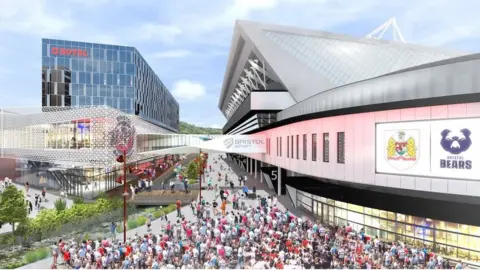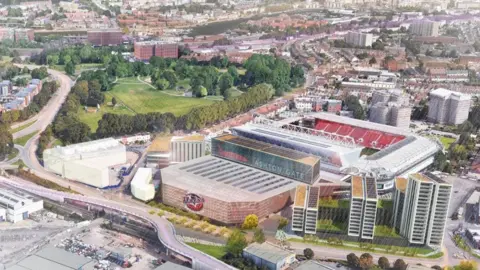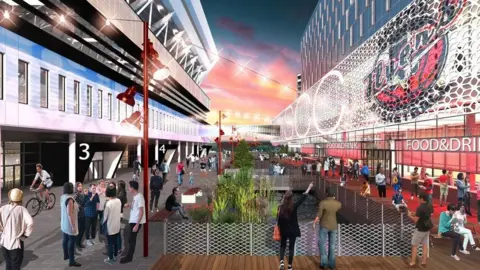Plans for £100m indoor arena in Bristol unveiled
 Ashton Gate
Ashton GatePlans for a £100m purpose-built indoor arena in Bristol have been unveiled.
The 4,000-capacity sports and convention centre, adjacent to Ashton Gate, would also host entertainment events, developers said.
The venue would be the largest indoor arena in the city and provide a permanent home for the Bristol Flyers basketball team.
A pre-planning application will be made to Bristol City Council following a public consultation.
Details of the arena, which would be attached to the Lansdown Stand at Bristol City's ground, were unveiled by Ashton Gate chairman Martin Griffiths on Tuesday.
 Ashton Gate
Ashton GateEarlier this month, the city's mayor Marvin Rees scrapped an unrelated plan to build an entertainment arena in the city centre in favour of a mixed-use development.
Proposals for an arena next to Temple Meads railway station had first been mooted in 2003 but were beset by delays.
Mr Rees' decision paves the way for a privately-funded arena to be built at the Brabazon hangar on Filton Airfield on the outskirts of the city.
The newly-announced venue next to Ashton Gate would create the biggest indoor arena in the city, double the size of Colston Hall which has a capacity of just under 2,000.
Housing, a multi-storey car park and two hotels are also included in the proposals.
Mr Griffiths said: "It has been more than two years in the planning to ensure that phase two of Ashton Gate's redevelopment into a city quarter focused on sport and entertainment was indeed viable, sustainable and most importantly achievable."
 Ashton Gate
Ashton GateBristol City FC's stadium was rebuilt between 2014 and 2016 at a cost of £45m.
Mr Griffiths said: "Following the successful transformation of Ashton Gate stadium, it was always the aspiration to develop it further to give our basketball team, the Flyers, a permanent and secure playing home."
Last week, North Somerset Council planners approved the club's plan for a new training ground at its base in Failand, north Somerset, including a 500-seat floodlit stadium.
Club bosses said the development was "key to Bristol City's future".
